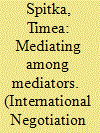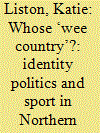| Srl | Item |
| 1 |
ID:
158142


|
|
|
|
|
| Summary/Abstract |
The conditions under which multilateral international intervention are effective in ending a violent conflict is a critical question for scholars and practitioners. Scholarly studies have demonstrated the importance of a united intervention but have been in disagreement over the effectiveness of neutral versus partisan intervention. This article examines the conditions under which mediators construct a consensus on the type of intervention process. What are the factors that enable a consensus on a neutral versus a partisan intervention? Distinguishing between four types of international intervention processes – united-neutral, united-partisan, divided-partisan, and divided neutral and partisan intervention – this article argues that it is a united intervention, whether united partisan or united-neutral, that contributes to creating leverage on conflicting parties to end a conflict. The article examines consensus building among mediators within two divergent case studies: Northern Ireland and Bosnia and Herzegovina.
|
|
|
|
|
|
|
|
|
|
|
|
|
|
|
|
| 2 |
ID:
164302


|
|
|
|
|
| Summary/Abstract |
This article responds to calls in this journal for increased attention to identity, culture, power and sport. It explores, for the first time, the lived realities of identity politics in a divided society, through interviews with 12 self-declared Irish nationalists and republicans that represented Northern Ireland. Important insights are revealed into national eligibility decisions for either Irish team, motivated mainly by ‘shop window’ visibility and being seen as the best of a peer group. Political and sporting nationalisms were not necessarily analogous. A significant original finding is that the lived experiences of being closer to ‘the other’ resulted in an overall reinforcement rather than dissolution of difference. Visual and oral ‘national’ symbols such as flag, and especially anthem, delineated such difference, being symbolic walls of the mind. ‘Our wee country’ was thus a polarised and polarising fantasy shield. The article concludes by reconsidering the role of sport as a lens through which to examine identity and its’ place as part of the ‘problem’ and ‘solution’.
|
|
|
|
|
|
|
|
|
|
|
|
|
|
|
|